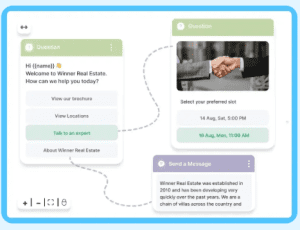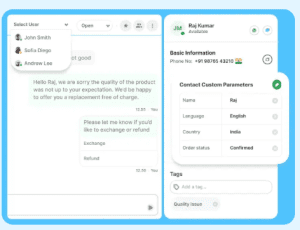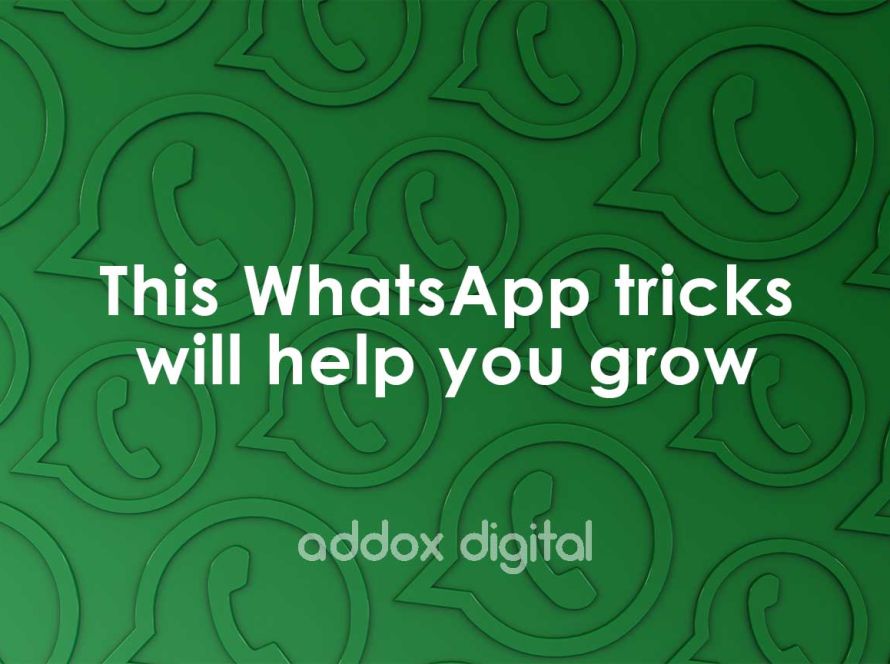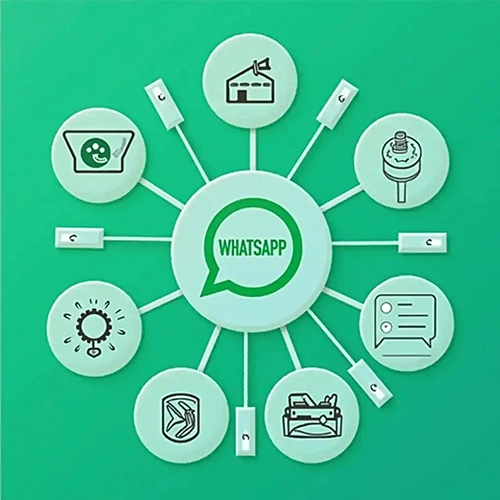Did you know? Over 85% of Indian smartphone users prefer WhatsApp for messaging—and businesses are turning this habit into sales.
WhatsApp automation is becoming a go-to tool for B2C brands to talk to leads instantly, provide quick support, and close deals faster.
With so many tools and platforms out there, why is WhatsApp automation working so well? This blog will show you how one Indian brand turned it into a lead-converting machine.
Understanding WhatsApp Automation
WhatsApp automation means using software tools to send and respond to messages automatically on WhatsApp. It’s like having a 24/7 salesperson who can answer questions, share product links, and follow up with leads instantly.
For Kerala customers, WhatsApp feels more natural than email or web forms. With automation, brands can send timely reminders, festive offers, or onboarding messages—without lifting a finger.
Caption: How WhatsApp automation engages leads automatically.
💡 Important Point: Over 50 million Indian businesses now use WhatsApp Business.
What People Do Now and Why It's Not Good
Traditionally, businesses call or email leads after a form is submitted. This often leads to delays, missed follow-ups, or unanswered calls. Salespeople also struggle to keep track of every lead.
Caption: Why old lead conversion methods fail.
💡 Important Point: Delayed responses reduce lead conversion by 80%.
Common Mistakes in Lead Handling
Late responses – Leads lose interest quickly.
Generic replies – Poor personalisation turns people off.
Overloaded teams – Manual work tires your sales team.
No tracking – You can’t improve what you can’t measure.
Missing festive moments – No timely offers = lost sales.
A Better Way to Do Things
Enter WhatsApp automation. With ready-to-use templates and instant replies, leads feel attended to—within seconds. Automation tools now integrate with CRMs and landing pages, creating a smooth journey.
Caption: The new way—automated and personalized.
💡 Important Point: Businesses using automation see 2X more lead conversion.
Main Ideas of the New Method
Auto Replies: Welcome and qualify leads instantly.
Personalised Campaigns: Offers based on user interest.
Lead Tracking: Follow lead actions via dashboard.
CRM Integration: Sync chats with your sales software.
Festive Flows: Trigger seasonal campaigns automatically.
Why This New Way is Good
When you respond within minutes (or seconds), leads feel valued. When they get the right message at the right time, they’re more likely to say “yes.” It’s that simple.
Caption: 4X faster conversions with WhatsApp automation.
💡 Important Point: Some brands saw 60% drop in customer acquisition cost.
Things That Get Better
Lead response time: Reduced from hours to seconds
Conversion rate: Increased by 45% in 3 months
Team workload: Reduced by 35%
Customer satisfaction: Increased NPS from 5 to 8
How to Use WhatsApp Automation
First Step: Choose the Right Tool
Pick a tool like Interakt, WATI, or Zoko that supports automation and works with WhatsApp Business API.
Second Step: Create Message Flows
Set up auto-replies, lead capture forms, and drip messages.


Third Step: Integrate with CRM
Connect your CRM or Excel to store and analyse leads.
Caption: Setup process for WhatsApp automation.
👉 Expert Advice:
Start with welcome flows
Personalise messages using name & interest
Send messages during peak user hours
A Real Example
The Problem: Lost Leads, Slow Replies
kerala D2C skincare brand was losing 50% of its leads to poor follow-ups and delayed replies.
What They Did: Introduced WhatsApp Automation
They integrated WhatsApp with their landing page and added a chatbot for common FAQs. Abandoned carts got reminders via WhatsApp.
What Happened: Big Jump in Conversions
Within 2 months, lead conversion rose by 42%. Revenue from WhatsApp alone grew by ₹12 lakhs/month.
Caption: D2C brand success using WhatsApp automation.
Best Ways to Use WhatsApp Automation
Use it not just to sell, but to connect.
Top Method 1: Welcome Flows
First impressions matter—make users feel noticed instantly.
Top Method 2: Abandoned Cart Follow-ups
One reminder = big revenue lift.
Top Method 3: Festive Campaigns
Use pre-set flows for Diwali, Holi, Eid offers.
Caption: Smart campaign ideas using WhatsApp.
💡 Important Point: Timing + context = better open rates.
Solving Common Problems
Even automation needs human touch sometimes.
Problem 1: Messages not delivered
👉 Fix: Use verified WhatsApp API providers.
Problem 2: Low engagement
👉 Fix: A/B test your messages and tone.
Problem 3: Too many unsubscribes
👉 Fix: Add value first—sell second.
Caption: Common problems and smart fixes.
👉 Expert Advice:
Avoid spamming
Ask for feedback
Segment your leads
What’s Coming Next in Automation
The future is smarter automation + AI.
New Trend 1: Voice Notes in Automation
Brands are adding voice notes for a personal touch.
New Trend 2: Hyper-Personalized Offers
Using AI to match user interests with real-time product suggestions.
New Trend 3: WhatsApp Payments
Soon, customers can buy directly in chat.
Caption: Future of WhatsApp automation.
💡 Important Point: Early adopters will win trust (and sales).
Common Questions People Ask
Q: Can small businesses use WhatsApp automation?
A: Yes, even kirana shops and small D2C brands can start with low-cost tools.
Q: Is it allowed by WhatsApp?
A: Yes, if you use WhatsApp Business API with approved partners.
Q: What are the costs involved?
A: Basic tools start around ₹1500/month. API providers may charge more.
Q: Can I track leads from WhatsApp?
A: Yes, tools show engagement, clicks, and conversions.
Caption: Most asked questions on WhatsApp automation.
What to Do Next
In today’s fast-paced market, you can’t afford to keep leads waiting. WhatsApp automation gives you a smart, scalable way to boost sales without hiring more people.
Here’s what to do:
Choose a tool – Compare platforms like Interakt or WATI.
Create smart flows – Auto-replies, FAQs, festive campaigns.
Test and grow – Track what works and double down.
Caption: Time to take charge of your lead conversion.



